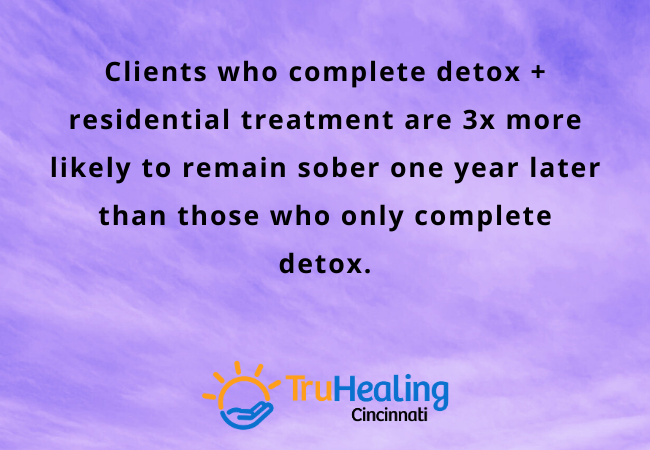For many individuals beginning their journey to recovery, the first step is completing a Medical Detox Program in Cincinnati, Ohio. While detox is critical for safely removing substances from the body, it’s not enough on its own to ensure lasting recovery.
The real work of healing begins after detox — through a structured, supportive Residential Treatment Program in Cincinnati, Ohio that addresses the emotional, psychological, and behavioral aspects of addiction. Without continued care, the risk of relapse significantly increases.
In this blog, we’ll explore why residential treatment is a crucial next step after detox and how TruHealing Cincinnati can help you build a strong foundation for lasting sobriety.
Detox Is Just the First Step — Not the Final Solution
Medical detox plays a vital role in Substance Abuse Treatment in Cincinnati, Ohio by managing the often painful and potentially dangerous withdrawal symptoms associated with drugs and alcohol. However, detox alone doesn’t address the root causes of addiction.
What Detox Does:
- Cleanses your body of substances
- Manages withdrawal symptoms
- Stabilizes you physically and medically
- Prepares you for behavioral therapy
What Detox Doesn’t Do:
- Treat underlying trauma or mental health conditions
- Change thought patterns or coping behaviors
- Teach relapse prevention skills
- Provide long-term emotional support
That’s where residential treatment comes in — bridging the gap between physical stabilization and full-spectrum recovery.
The Role of Residential Treatment After Detox
A Residential Treatment Program in Cincinnati, Ohio provides a safe, structured, and immersive environment where individuals can heal deeply and develop the skills needed to maintain sobriety long after treatment ends.
Core Benefits of Residential Care After Detox:
- 24/7 Support and Supervision
Prevents early relapse during one of the most vulnerable stages of recovery. - Therapeutic Immersion
Includes daily individual therapy, group sessions, and evidence-based approaches like CBT and DBT. - Peer Accountability
Builds community with others in recovery — reducing isolation and shame. - Dual Diagnosis Care
Treats co-occurring mental health disorders, which often drive substance use. - Stability and Routine
Reintroduces structure, healthy habits, and self-discipline that addiction disrupted.
What Happens in Residential Treatment at TruHealing Cincinnati?
At TruHealing Cincinnati, our Addiction Treatment Center in Cincinnati, Ohio is designed to help you rebuild your life after detox with compassion, structure, and evidence-based care.
Program Features Include:
- Individual Therapy – To explore root causes of substance use
- Group Therapy – For community, accountability, and shared healing
- Family Therapy – To repair relationships and educate loved ones
- Psychoeducation – To understand the science of addiction and recovery
- Holistic Wellness – Yoga, mindfulness, nutrition, and fitness
- Medication Management – For mental health and MAT (if needed)
Each treatment plan is personalized to your unique history, goals, and health needs.
Detox Without Treatment = Detox Without Direction
Many individuals believe that once substances are out of their system, the hard part is over. Unfortunately, this belief leads to a common mistake: stopping treatment after detox.
Why detox-only approaches often fail:
-
No behavior change: The thinking patterns and habits behind addiction remain.
-
No relapse prevention skills: Without coping strategies, triggers quickly lead to relapse.
-
No community or accountability: Isolation increases vulnerability.
-
No emotional healing: Detox clears the body, but not the trauma, guilt, or shame that fuel substance use.
At TruHealing Cincinnati, we guide you immediately from Medical Detox Program Cincinnati, Ohio into residential treatment to avoid this all-too-common gap in care.
Relapse Prevention Starts in Residential Care
The time immediately following detox is when you’re most vulnerable — and when relapse prevention is critical. That’s why residential treatment includes daily therapy focused on identifying triggers and building healthy responses.
Core relapse prevention strategies you’ll develop:
-
Recognizing high-risk situations and emotions
-
Creating an emergency coping plan
-
Managing cravings with grounding techniques
-
Setting boundaries with toxic people or environments
-
Building a structured, substance-free lifestyle
These tools are then reinforced in Partial Hospitalization Treatment in Cincinnati, Ohio and Intensive Outpatient Treatment in Cincinnati, Ohio to ensure long-term success.
The Role of Peer Support in Residential Treatment
Healing from addiction isn’t something you should do alone. In residential treatment, community becomes a vital force in recovery.
How peer support empowers recovery:
-
Validation: You’re not alone in your struggle.
-
Accountability: Group dynamics help you stay committed.
-
Encouragement: Others help you push through difficult days.
-
Role modeling: Witnessing others’ progress provides hope.
In group therapy sessions and shared daily routines, clients at our Addiction Treatment Center in Cincinnati, Ohio often say peer connection was one of the most powerful parts of their journey.
How Individualized Residential Treatment Sets the Stage for Lifelong Sobriety
There’s no such thing as “one-size-fits-all” in recovery. At TruHealing Cincinnati, your experience in residential treatment is personalized to your story, substance use patterns, mental health needs, and life goals.
Individualized elements of our program include:
-
Customized therapy plans (CBT, DBT, trauma therapy)
-
Medication-assisted treatment (MAT) options
-
Mental health assessments and treatment
-
Vocational or education planning
-
Cultural and spiritual accommodations
Your treatment team works closely with you to build a plan that doesn’t just get you sober — it helps you stay sober, and thrive.
Why Skipping Residential Treatment Can Be Risky
Many people feel “better” after detox and assume they can stay sober on their own. Unfortunately, that’s often when relapse risk is highest.
Here’s why skipping residential care can be dangerous:
- Cravings intensify without support
- Triggers and stressors return immediately
- Mental health symptoms often emerge after substance removal
- Old habits can quickly reassert themselves
Residential treatment gives you the time, space, and tools to respond differently to life — so you’re not just surviving without substances but thriving without them.
A Personalized Continuum of Care After Detox
At TruHealing Cincinnati, we don’t believe in one-size-fits-all recovery. Our team guides you from detox into the next best phase of care based on your needs.
Your journey may include:
- Medical Detox Program Cincinnati, Ohio
Safely and comfortably withdraw from substances. - Residential Treatment Program in Cincinnati, Ohio
Heal deeply in a structured, immersive environment. - Partial Hospitalization Treatment in Cincinnati, Ohio (PHP)
Transition with intensive daytime care and evening independence. - Intensive Outpatient Treatment in Cincinnati, Ohio (IOP)
Maintain support while returning to work, school, or family life.
Our goal is to provide a full recovery pathway — not just a short-term solution.
Conclusion
Completing a Medical Detox Program in Cincinnati, Ohio is a brave first step — but it’s just the beginning. Without residential treatment, the mind, emotions, and patterns that led to substance use remain unaddressed.
At TruHealing Cincinnati, we help you bridge the gap between detox and lasting recovery. Our Residential Treatment Program in Cincinnati, Ohio gives you the structure, therapy, and support you need to heal completely — not just physically, but mentally and emotionally. Call TruHealing Cincinnati today at 513.643.9118 to take your next step after detox — and reclaim your life.
Frequently Asked Questions
Is it safe to leave detox and go straight home?
For many, no. Without structure and accountability, cravings and triggers can lead to relapse. Residential treatment provides a buffer between detox and daily life.
What if I can’t commit to 30+ days in a residential program?
We’ll work with your schedule and may suggest PHP or IOP options if appropriate. However, residential care is strongly recommended post-detox when possible.
Does insurance cover residential treatment?
Most major insurance plans cover residential care. Our admissions team can verify your benefits confidentially and quickly.
What if I have a mental health diagnosis too?
That’s common. We specialize in dual diagnosis care — treating addiction and mental health together for the best outcomes.


